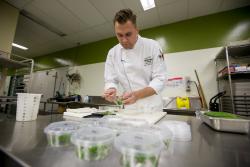
Members of Lethbridge College’s culinary research team are learning to use their senses to judge the quality of produce and fish produced in the college’s Aquaculture Centre of Excellence.
The Lethbridge College researchers, along with partners from Okanagan College’s Culinary Arts Team, are undergoing three days of organoleptic training this week at Lethbridge College. Administered by Sirocco Food and Wine Consulting, the training teaches participants to use the senses of taste, texture, sight and smell to create protocols which allow testers to subjectively evaluate the quality of foods.
“This training is the first step to developing unique applied research skills within our Culinary program,” says Mike Long, director of Applied Research at Lethbridge College. “We have also planned faculty and student exchanges with Okanagan College over the next four years; our students will learn wine pairing skills and Okanagan students will learn about aquaponically-grown produce.”
Once their training is complete, participants will be able to teach students important skills that will serve them in the culinary industry. “Our students will be able to critique the ingredients they purchase and use in their everyday work,” says Lethbridge College chef Doug Overes, chair of the college’s Culinary Careers program. “Employers value such skills because it improves the quality of their products.”
This is a key step in the long-term plan of developing fish and produce for commercial use from the college’s Aquaponics program, supported by the Centre for Applied Research and Innovation (CARI). Currently fish, such as tilapia, and produce, such as lettuce, tomatoes, cucumbers and bok choy, are being produced through water recirculation technologies and green house operations at the college.
The organoleptic training is part of a grant Lethbridge College received from the Natural Sciences and Engineering Research Council of Canada (NSERC) for an Aquaponics project.
“In the year since we received the $2 million NSERC award, we have received tremendous interest from industry and community,” says Long.
One of the goals of the Aquaponics project is to create safe and sustainable food production systems. The ability to provide evidence-based evaluations of food produced by the college’s Aquaponics operation will both help improve production quality and create value to industry interested in commercializing aquaponically-grown produce for market.